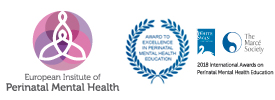 The World Health Organization (WHO) recognizes a “positive childbirth experience” as a significant end point for all women undergoing labor. It defines a positive childbirth experience as one that fulfils or exceeds a woman’s prior personal and sociocultural beliefs and expectations, including giving birth to a healthy baby in a clinically and psychologically safe environment with continuity of practical and emotional support from a birth companion(s) and kind, technically competent clinical staff.
The World Health Organization (WHO) recognizes a “positive childbirth experience” as a significant end point for all women undergoing labor. It defines a positive childbirth experience as one that fulfils or exceeds a woman’s prior personal and sociocultural beliefs and expectations, including giving birth to a healthy baby in a clinically and psychologically safe environment with continuity of practical and emotional support from a birth companion(s) and kind, technically competent clinical staff.
Although identified by the World Health Organization (WHO) as a global health priority, maternal mental health does not receive much attention even in the health systems of developed countries. With pregnancy monitoring protocols placing priority on the physical health of the mother, there is a paucity of literature documenting the traumatizing effects of the birth process.
This qualitative descriptive study aimed to investigate women´s perceptions of living a traumatic childbirth experience and the factors related to it. It revealed five major themes:
- Birth Plan Compliance
Women stressed the importance of the issue regarding when maneuvers and techniques such as membrane sweeps, fundal pressure, episiotomies and use of forceps and spatulas are carried out without their consent and without receiving any explanation of the maneuver or the medical reason for it.
The subtheme Healthcare staff not empathetic was the most frequently commented on and was mentioned by nearly all participants.
“The gynecologist ruptured my membranes without my permission, ignoring my requests and my agreement with the midwife. This caused a conflict between the two (midwife and gynecologist). At no time did they give me any medical justification.”
“My birth was not respected at all. The midwife told me that I didn’t know how to push, and it was my fault that the baby wasn’t coming out. He tried to apply fundal pressure without explaining what he was doing. When I refused, he ignored me and tried to do it again. When I refused for the second time, he lost interest in me. It was the most brutal thing I have ever experienced.”
- Obstetric problems
This theme was divided into two: problems during childbirth and problems postpartum.
Problems during childbirth: episiotomies, lacerations, pain due to pain relief not working or not waiting for it to work, or being given an epidural at the wrong time or with improper technique.
“I had a C-section and they began cutting before the anesthesia had taken effect (I told them that I could feel the wet cloth they rubbed over my belly, but they still began cutting) so I felt the pain of them cutting me and I could feel their hands opening my belly.”
“It was horrible, I tear up when I think back to it. The pain was awful, and they had to administer the epidural more than four times because my doctor had difficulty doing it.”
Problems in the postpartum: problems related to the pelvic floor, such as constipation, incontinence and dyspareunia, as well as problems with sex.
“Since my first pregnancy I have had a lot of problems with hemorrhoids and urine infections. Until I went to a private specialist to prepare for my second childbirth, I didn’t realize that the cause of these problems was that my pelvic floor hadn’t recovered.”
- Mother-infant bond
The women told us that this theme is special because it has a positive influence on the psychological relationship between mother and baby and they ask for respect in order to strengthen this bond as much possible and not break it, as occurs in certain hospitals. It requires skin to skin contact, and breastfeeding initiation.
“Giving birth seemed like a cold experience. I was alone in the operating room with my hands tied, I was allowed to see and kiss the baby for two minutes then they took her away with my husband and because of nerves or whatever he didn’t remember to make skin-to-skin contact and the nurse didn’t remind him.”
“It was a bad experience because they separated me from my babies when they were born and even though they kept saying that skin-to-skin was so important, they took my daughters away and put them in an incubator without even showing me them so I could see they were okay. I felt alone, without my daughters or my husband, who they didn’t let in. I had to keep my own spirits up otherwise I would have been really upset.”
“Breastfeeding was very, very hard. Extreme tiredness. I felt powerless. Sometimes I wanted to disappear. External pressure to begin artificial feeding and you start to feel unsure of yourself and wonder whether you’re doing it right by breastfeeding every 15 or 20 min. I wondered if they were really hungry and if I was being stubborn with breastfeeding. In the end I managed to stick with breastfeeding. They’re now 14 months old and they continue to feed on demand (I’m still criticized now).”
- Emotional wounds
These emotional problems vary from general feelings like crying all the time about anything to fear surrounding problems that could come up.
This main theme Emotional wounds includes 4 subthemes: Fear of things not going well, Stress and frustration, Loneliness, and Depression.
“Sometimes the situation overwhelms you and you just cry about everything and feel very small in front of this small person who is going to be your main concern for the rest of your life, the whole thing is scary.”
“Mothers aren’t given much consideration in hospitals. For us, it’s a brutal experience and in some places human warmth is really lacking.”
“The early days of being a mum were very hard, I had lots of doubts and above all, I felt very lonely despite being surrounded by my family.”
“The hardest thing postpartum was the pressure from people around me, everyone knows everything and judges and although I thought I could handle anything, in the end I couldn’t because I became very withdrawn due to exhaustion and the negative comments about how I was caring for the babies. I had postpartum depression and had to be on medication for more than a year.”
“After a risky pregnancy and having a premature baby, I couldn’t breastfeed my baby, which made me feel depressed. I had postpartum depression which I still have today, because my husband also got depressed and now, we don’t have a good relationship.”
- Perinatal experiences
Traumatic experience refers to women’s description of the perinatal process as traumatic and something which has stayed with them. On several occasions, the women themselves use the term ‘traumatic’ in their descriptions, often in relation to C-sections or instrumental births, the use of techniques such as applying fundal pressure, episiotomies, and so on.
“A traumatic experience. My first childbirth was a disaster: induction, my partner wasn’t allowed in, the epidural didn’t work, fundal pressure was applied, I had an episiotomy, no skin-to-skin contact.”
Obstetric violence, or feeling violated. This sensation comes from multiple vaginal examinations by multiple professionals during the childbirth process. It can have dire mental health consecuences.
“All this time they did endless vaginal examinations, another thing I asked them not to do unless really necessary. I felt violated and humiliated.”
“A lot of students and doctors came to examine me, it was very uncomfortable and happened during the early morning, morning and night shifts. I saw at least 15 people and they all examined me, it was very uncomfortable, I felt like I was being continually violated.”
Fear, loneliness, traumatic stress, and depression were recurrent themes in participants’ responses.
Good things, too…
There were a group of women who reported their perinatal process as a wonderful experience. This type of childbirth is usually associated with a quick, pain-free, instrument-free birth, normally accompanied by their partner. Women that rated their childbirth as wonderful were those that received excellent care and empathy from healthcare personnel.
“During labor I felt very protected by all of the staff. It was a magnificent experience.”
“The whole process from being admitted to holding my baby in my arms took three and a half hours. It was an excellent birth, with excellent care. For me, it was a great experience. I was respected and cared for.”
As the actions of healthcare personnel can substantially impact a birth experience, the study findings strongly suggest the need for proper policies, procedures, training, and support to minimize negative consequences of childbirth.
Read whole article at:
Julián Rodríguez-Almagro,,Antonio Hernández-Martínez, David Rodríguez-Almagro, José Miguel Quirós-García, Juan Miguel Martínez-Galiano, and Juan Gómez-Salgado







